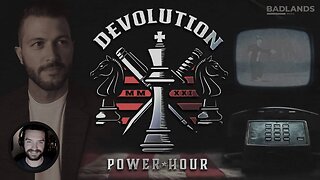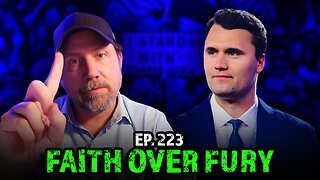Premium Only Content

Life Awakened Psalm 119:93
How has meditating on God's precepts brought new life to your spirit today?
Like, subscribe and comment. I read all comments
# Song Title: Life Awakened
## Song Style and Performance Notes
This worship song is inspired by Bethel Music and Hillsong Worship, featuring intimate verses that build into anthemic choruses with soaring melodies and emotional dynamics. Play in the key of G major for accessibility and warmth.
- **Tempo**: 72 BPM (mid-tempo, allowing for reflective build-up to passionate release).
- **Rhythm**: Steady 4/4 time signature with a driving quarter-note pulse in verses, shifting to half-time feel in the bridge for emphasis, then full band crescendo in final chorus.
- **Instruments**: Start sparse with acoustic guitar (fingerpicked arpeggios) and piano (sustained chords). Add electric guitar (ambient swells and delay effects), bass (root-note emphasis), drums (subtle kick and snare build), and synth pads for atmospheric depth. Include background vocals for harmonies in choruses to evoke communal worship.
## Lyrics
**Verse 1**
In the quiet of my soul, Your precepts call my name,
A light in darkest trials, igniting sacred flame.
Like Wishart facing fire, quoting words of grace,
Pardoned in the moment, Your mercy I embrace.
**Pre-Chorus**
Not just duty's heavy chain, but life-affirming breath,
Your word, a means of grace, reviving from the depth.
**Chorus**
I will never forget Your precepts, oh Lord,
For by them You have given me life.
Eternal truth, my heart's delight,
In devout meditation, I find my strife subsides.
You awaken me, You sustain me,
God's word alive in me!
**Verse 2**
Through affliction's weary road, Your statutes hold me near,
A model of devotion, casting out all fear.
No mere obligation, but joy in every line,
Serving You revives my spirit, makes this heart align.
**Pre-Chorus**
Not just duty's heavy chain, but life-affirming breath,
Your word, a means of grace, reviving from the depth.
**Chorus**
I will never forget Your precepts, oh Lord,
For by them You have given me life.
Eternal truth, my heart's delight,
In devout meditation, I find my strife subsides.
You awaken me, You sustain me,
God's word alive in me!
**Bridge**
Oh, the power in Your promises, breathing hope anew,
From death to resurrection, all because of You.
Like ancient psalms that saved a soul from flame's cruel bite,
Your grace pours out, turning night to endless light.
**Final Chorus (Build with full band and harmonies)**
I will never forget Your precepts, oh Lord,
For by them You have given me life!
Eternal truth, my heart's delight,
In devout meditation, I find my strife subsides.
You awaken me, You sustain me,
God's word alive... alive in me!
## Call to Action Question
How has meditating on God's precepts brought new life to your spirit today?
### Background of Psalm 119:93
Psalm 119:93 reads, "I will never forget your precepts, for by them you have given me life" (NIV), or in variations like "revived me" or "quickened me" in older translations such as the KJV. This verse is part of Psalm 119, the longest chapter in the Bible with 176 verses, structured as an elaborate acrostic poem in Hebrew. The psalm is divided into 22 stanzas, each corresponding to a successive letter of the Hebrew alphabet (from Aleph to Taw), with every verse in a stanza beginning with that letter to aid memorization and emphasize completeness. Verse 93 falls within the "Lamed" stanza (verses 89–96), which focuses on the eternal and unchanging nature of God's word, contrasting it with the temporary afflictions of life.
The overall theme of Psalm 119 is a passionate meditation on the value, beauty, and transformative power of God's word, referred to through eight synonymous terms: law (torah), word (dabar), judgments (mishpatim), testimonies (edut), commandments (mitzvot), statutes (huqqim), precepts (piqqudim), and promises (imrah). The psalmist expresses delight in obeying God's instructions, seeking guidance, and finding refuge in them amid personal trials, such as persecution or affliction. Authorship is uncertain and anonymous in the text itself; traditional Jewish and Christian views attribute it to King David, possibly compiled from reflections throughout his life of trials and devotion. However, some scholars propose a post-exilic origin (after the Babylonian captivity around 538 BCE), potentially by Ezra the priest or another figure like Daniel, given references to temple rebuilding and a mature, reflective tone on the law. The historical context likely involves a time of personal or communal distress, where the psalmist turns to God's law for stability, possibly during exile or opposition from authorities.
### Meaning of Psalm 119:93
At its core, the verse is a personal declaration of unwavering commitment: the psalmist vows never to forget God's "precepts" (piqqudim in Hebrew, meaning detailed instructions or mandates from God). The reason is profound—through these precepts, God has "given me life," which carries a dual interpretation. First, it refers to spiritual quickening or revival: God's word awakens the soul from spiritual death caused by sin, imparting eternal life and transforming the believer. Second, it denotes practical preservation in affliction, where the precepts provide comfort, hope, and strength to endure trials without perishing emotionally or physically. This connects to nearby verses, like 119:92 ("Unless your law had been my delight, I would have perished in my affliction"), underscoring reliance on God's word during hardship.
Commentators like Albert Barnes and John Calvin interpret this as evidence of God's grace working through His word to revive and sustain, leaving an indelible impression that motivates lifelong obedience. John Gill adds that the precepts revive when one is "dead in sin" or overwhelmed by sorrow, emphasizing their divine origin and power to change lives. Overall, the verse teaches that engaging with God's instructions isn't mere duty but a source of vitality, encouraging believers to meditate on and apply Scripture for personal renewal.
### History of Psalm 119:93
Historically, Psalm 119:93 has been interpreted within the broader legacy of Psalm 119 as a cornerstone text on the sufficiency and life-giving role of Scripture. Early Jewish rabbis and medieval commentators like Rashi and Radaq viewed the psalm as David's composition, using it in teachings on Torah observance. In Christian tradition, Reformation figures such as John Calvin (16th century) highlighted its emphasis on God's word as a means of grace, influencing Protestant views on sola scriptura (Scripture alone). Puritan writers like Matthew Henry (17th–18th century) saw it as a model for devout meditation, with his father encouraging daily reflection on one verse of Psalm 119.
The verse and psalm gained prominence in personal devotion; figures like Martin Luther, John Ruskin, William Wilberforce, Henry Martyn, and David Livingstone memorized Psalm 119, drawing inspiration from its themes of revival through God's precepts. In the 16th century, martyr George Wishart had Psalm 119 sung before his intended execution, and his pardon arrived mid-psalm, symbolizing its life-preserving motif. Musically, composer Heinrich Schütz set paraphrases of Psalm 119 sections to music in the 17th century. Modern sermons and commentaries continue to apply it to spiritual growth, with recent writings (e.g., 2025 blog posts) stressing how studying God's word transforms believers amid contemporary challenges. Interpretations have remained consistent, focusing on the eternal, revitalizing power of divine instruction rather than legalistic salvation by works.
-
 4:59
4:59
oDDBall daily bible quotes
1 month agoHasten to Your Light Psalm 119:60
652 -
 LIVE
LIVE
Badlands Media
10 hours agoDevolution Power Hour Ep. 392
9,087 watching -
 3:02:08
3:02:08
TimcastIRL
4 hours agoLeftist Terror Attack On ICE In Dallas, Jimmy Kimmel Doubles Down Insulting MAGA | Timcast IRL
322K130 -

Man in America
9 hours agoIs Starlink RIPPING Us Apart from the Inside Out? w/ Cory Hillis
19.7K10 -
 55:40
55:40
TheSaltyCracker
3 hours agoIdiots Chug Tylenol PT2 ReeEEStream 9-24-25
68K191 -
 LIVE
LIVE
Akademiks
4 hours agoYoung Thug Dissing YFN Lucci. Ready to Go back to Jail. Offset vs Cardi b
1,286 watching -
 7:07
7:07
Colion Noir
12 hours agoCalifornia Just Banned All Glocks
28.6K30 -

Adam Does Movies
5 hours agoTalking Movies + Ask Me Anything - LIVE
18.3K1 -

Jamie Kennedy
3 hours agoChoosing Good in a World Gone Dark | Ep 223 HTBITY with Jamie Kennedy
17.8K2 -
 LIVE
LIVE
SpartakusLIVE
7 hours ago#1 Challenge CHAMPION of WZ || Ridin' The GRAVY Train w/ GloryJean
428 watching